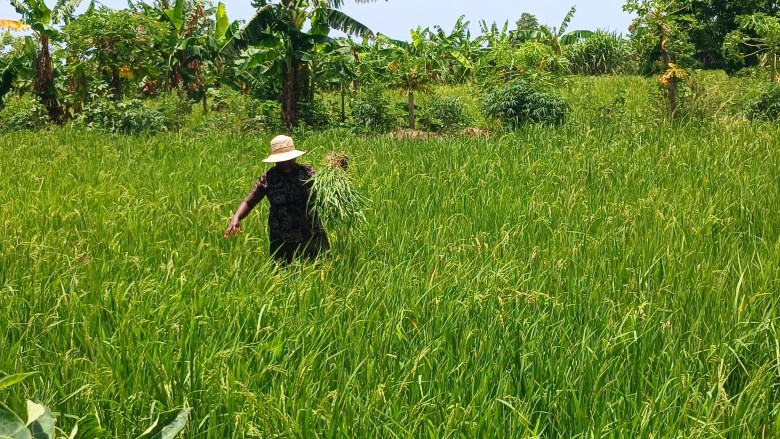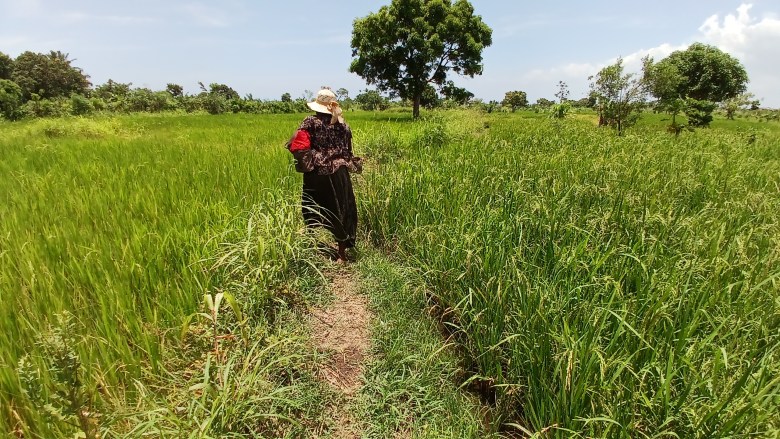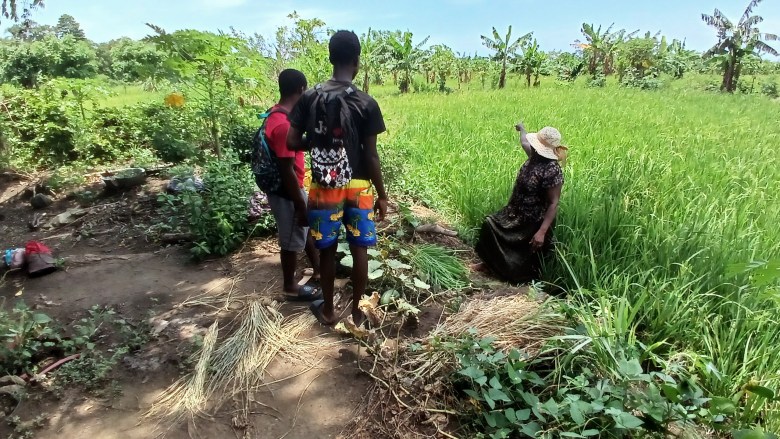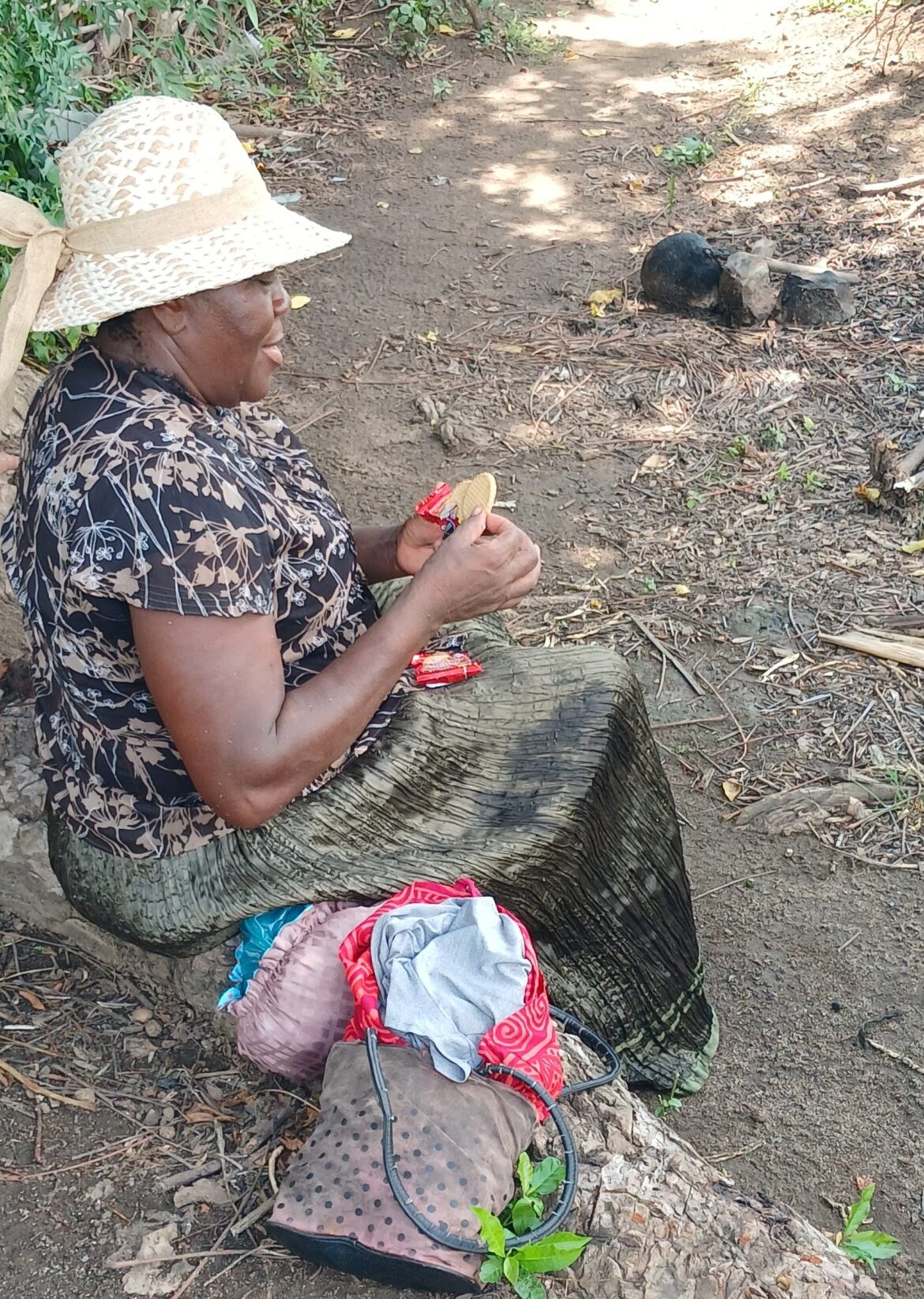Overview:
In Fort-Liberté, 57-year-old farmer Marianne Victore wakes earlier than dawn to stroll to her rice fields. At dwelling, she cares for 5 kids and a sick husband whereas supporting her grandchildren. Her story displays the important but invisible function of Haitian ladies farmers sustaining households and communities regardless of scarce assets.
FORT-LIBERTÉ — Each day at dawn, when most of her kids are nonetheless asleep, Marianne Victore ties on her wool hat, slips into her lengthy costume and walks greater than a mile to her rice fields at Cité Nébert—close to the doorway of the northeast’s capital metropolis. For the 57-year-old farmer, like a sacred ritual, this each day trek is extra than simply agricultural work — it’s survival, dignity and power rolled into one.
With a sick husband and 5 kids —Miryame, Fredeline, Loudrige, Anne Flavi and Donaldson Bijou — relying on her, Marianne has grow to be each breadwinner and spine of her household. She manages the family, tends to her crops and nonetheless finds vitality to be a grandmother to a few.
“It’s an enormous weight on my shoulders,” she says.
“The burden of the home, the kids, and my husband.”
Her story is a strong reminder of Haitian ladies’s quiet power. In accordance with the Meals and Agriculture Group (FAO), ladies make up practically 47% of the nation’s agricultural labor drive but obtain little recognition or institutional assist.
In Fort-Liberté, Marianne’s rice harvest is greater than a livelihood — it’s a part of the area’s fragile chain maintaining meals on native tables.
“It’s an enormous weight on my shoulders, the load of the home to supply for all the kids and my husband.”
Marianne Victore, Native of Fort-Liberté
Agriculture accounts for about 20–25% of Haiti’s Gross Home Product (GDP) and practically half of employment, the World Financial institution reported in 2020. However ladies farmers, regardless of being central to manufacturing and meals safety, management little land, earn lower than males and face obstacles to credit score and fashionable instruments.
Carrying the household alone
Marianne as soon as shared the workload along with her husband, Jean Frenel Bijou. His sickness, nonetheless, pressured her to shoulder all the burden.
Now, Bijou watches from dwelling, proud but saddened by his spouse’s relentless battle. His present well being situation stays a relentless supply of disappointment for Marianne.
“Earlier than he fell unwell, we labored collectively within the backyard. It was far more joyful,” she recalled.
“I want to sit and care for him all day. However I can’t — the home depends upon me.”
Her kids pitch in once they can.
“When my mom is planting rice, if we’re not at college, we assist her by cooking or doing different issues,” stated her youngest daughter, Anne Flavi.
Marianne’s journey in agriculture has been one among adaptation. After setbacks in corn and pistachio manufacturing, Marianne switched to rice — a crop higher suited to the Coicou plain, adjoining to Fort-Liberté at lower than two miles of distance, and extra dependable and worthwhile for her household’s wants. She does a lot of the work by herself.
“I plow the land, I clear it, I dig the soil, and I uproot the bushes to make the land prepared,” she defined proudly.
Marianne’s about 124-acre plot now produces as much as half a ton of rice per yr. In good years with sufficient water, she harvests thrice this quantity; in unhealthy years, solely as soon as.
“It’s a endless cycle, and day by day is a brand new problem,” she stated.

The challenges are fixed with the price of fertilizer, instruments, seeds and irrigation, typically forcing Marianne to decide on between getting ready the land and paying for tuition for Falvi, her youngest daughter.
“Costs rise quicker than she will be able to sustain, and typically I can’t afford what she [Anne Flavi] wants,” Marianne admitted.

“When there’s water, I harvest thrice, however in unhealthy seasons, I can solely harvest twice, typically solely as soon as,” she stated.
Regardless of the hardships, nonetheless, Marianne’s willpower evokes these round her. Neighbors typically cease by to lend assist.
“I attempt to go to Marianne each time I’ve a break,” stated neighbor and long-time good friend Fanius Augustin, often called Kabare. “It’s essential to present her braveness and hope.”
“How can a lady work so onerous in these situations?” requested one other neighbor, Davide Joseph. “It makes me respect her much more.”

Her brother, Gesner Victore, donated half of the land she cultivates to her.
“I see the difficulties she is enduring. I hope this may give her some respite,” Gesner stated. “ I’m so pleased with her heroic strengths.”
Her kids echo that satisfaction.
“My mom’s dream is obvious: she needs us to stay with dignity and dedicate ourselves to our research,” stated her daughter, Myriame, a theology pupil.
Her work highlights each the precariousness of the farming system and the pressing want for higher recognition of girls farmers and assist for his or her function in rebuilding the nation’s agricultural system. At the moment, she receives no help from both the Haitian authorities or non-governmental organizations (NGOs).
Marianne’s fundamental dream is to make sure a steady future for her kids and husband. She firmly believes that everybody deserves a dignified life, even when it means sacrifice.
“I aspire for my household to have a standard life, even when we will’t get every thing we would like. I would like my kids to have entry to what they want,” she stated.

